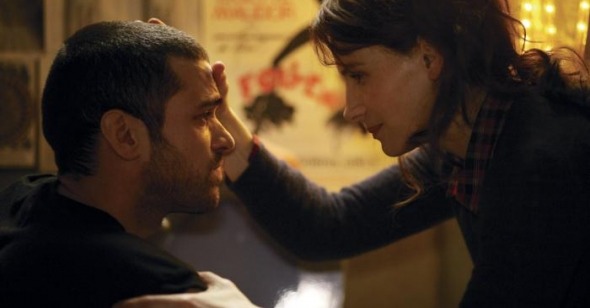Cedric the Entertainer
by Eric Hynes
Paris
Cedric Klapisch, France, IFC Films
The films of Cedric Klapisch are easy to dismiss. They seem a bit too slick of surface and shallow of meaning. They’re comfortably tucked between entertainment and art, between slumming intelligence and vainglorious style. They go down easy. Klapisch hasn’t the formal genius of contemporary countrymen like Assayas or Denis, nor the auteurist maximalism of Desplechin, and thus it’s easier to begrudge the fact that his films—When the Cat’s Away, L’auberge espagnole, and Russian Dolls to name a few—are easier and more profitable art-house imports. But Klapisch is worthy of greater respect, both because his films are smarter and more challenging than they at first seem, and because engaging, deft storytellers are exceedingly rare in contemporary cinema. Now that auterism is an overt career plan rather than an inarticulate compulsion, a popular filmmaker like Klapisch may have to wait for retrospective (and appropriately old-fashioned) recognition.
Paris, Klapisch’s latest film, assumes the familiar form of an interconnected urban melodrama, with lives crossing and colliding on the scenic Parisian streets. His gambit is to spark new life from stale material, rubbing two archetypes together until unpredictable flames emerge. His approach was similar for L’auberge Espagnol and Russian Dolls, but these were ensemble affairs polarized by a central protagonist (Romain Duris’s Xavier), its received notions emanating from individual experience. From the title on down, Paris takes a more direct tack: it’s an exploration—celebration even—of cliché. Klapisch doesn’t pursue the unseen Paris, he shoots Montmartre, the Eiffel Tower, museums, cafes, avenues and markets. His Parisians are all rank stereotypes, from prim baguette purveyor, Moulin Rouge dancer, egotistical academic and beguiling gamine, to crude working stiffs and immigrant dreamers.
Out of these emerge dyads—brother/sister, brother/brother, former lovers—that Klapisch shuffles into new relationships. No dynamic is particularly novel, but Klapisch is concerned with moments of truth embedded within or emerging from the familiar. Furthermore, he generously grants his characters a self-awareness to match his own. “Are you okay with the teacher-student cliché?” Roland (Fabrice Luchini) asks his conquest Laetitia (a luminous, pre-Inglourious Basterds Melanie Laurent). Yes, she answers. In fact she rather enjoys it. What would seem an expected tryst here plays as spontaneous, mutually agreeable playacting.
There are clichés of living, and then there are clichés of film. Klapisch plays around with both in Paris, but expressions of the latter often obscure his genius for identifying and honoring the former. Klapisch the writer is too keen to thread his character strands together, sacrificing plausibility and scenic integrity to make an intricate weave. At times the mise-en-scène evokes a Richard Scarry illustration, with the people of the city hustling about as simplistic symbols for themselves. A communion considerably less persuasive than the Roland and Laetitia affair involves a quartet of fashionistas hooking up with hunky laborers during a night shift, complete with forklift joyrides and fur coats dropped to the meat-locker floor. Opposites may attract, but it needn’t happen on cue or evoke a Sex and the City outer borough excursion. Yet Klapisch the director, the one who gives particularity to plotted pattern, almost saves this scene and others. He lets actors like Albert Dupontel and Zinedine Soualem move to internal rhythms, peopling rooms and making conversation of dialogue.
Romain Duris, appearing in his sixth Klapisch film, here assumes a central but detached role. Diagnosed with heart failure and given a 40% chance of survival, dancer Pierre camps out in his apartment, overlooking the city and Paris’s players from his balcony. Duris plays Pierre’s melancholy as both mortally justified and romantically indulgent, a complexity that’s wonderfully refracted whenever sister Elise (Juliette Binoche) sweeps into the room. As an overworked, over-sensitive single mother, Binoche hides her beauty and charisma behind gloomy resignation, a slouched contrast to Duris’s casual elegance. The specter of death hangs over their encounters, as well as over most of the other relationships in Paris, with finite existence overlapped with sustaining (if ambivalent and received) notions of love, family, and society.
As expected, and frankly wished for, Pierre and Elise finally let loose. And as intended, it’s the film’s high point. Against doctor’s orders, Pierre, desperate to dance, performs haltingly with his colleagues, Duris’s full eyes and weary sighs bridging the gaps between his movements. Elise later swirls across from a suitor, head shaking and hair flying, briefly but fully becoming Juliette Binoche, the most entrancing and humane actor of her generation. There’s cause to remain suspicious of Klapisch’s manipulations here, but only a true killjoy could deny such euphoria. Though ultimately less satisfying—yet more ambitious and adult—than L’auberge espagnole and Russian Dolls, Paris still manages to feel more alive than it ought to. Probably because our lives are more electively clichéd than we’d like to admit.
